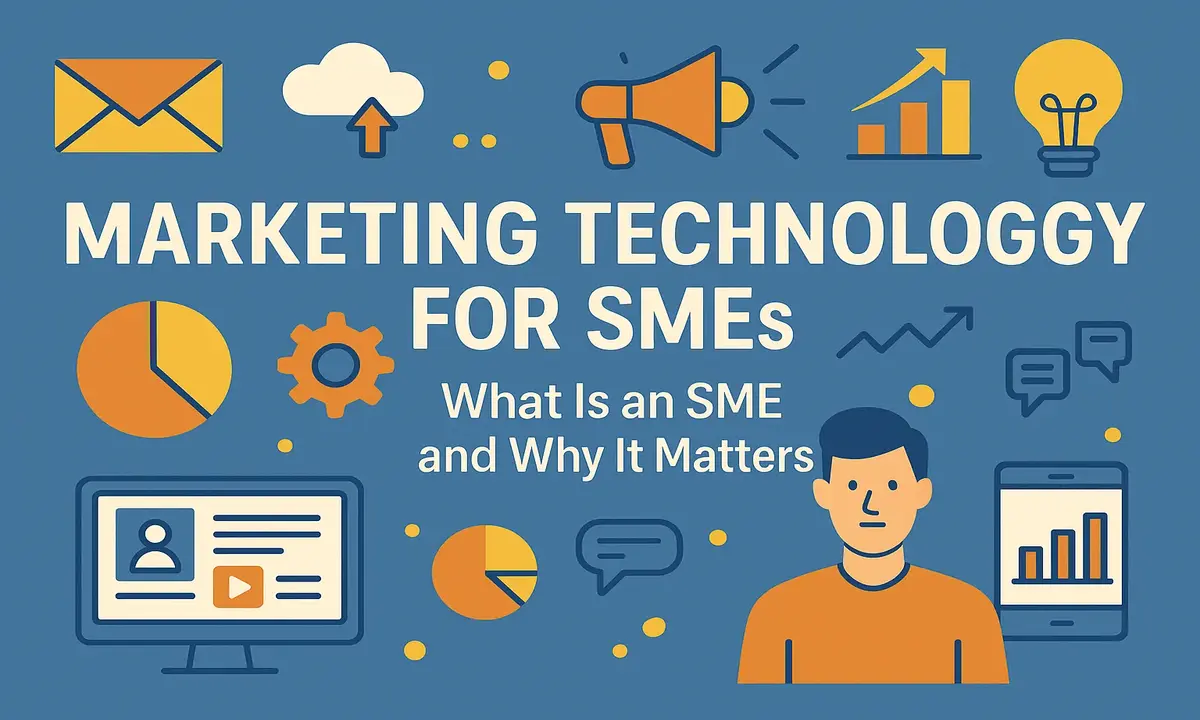Small and medium-sized businesses—commonly referred to as SMEs—are the foundation of economies worldwide. They create jobs, spark innovation, and often offer personalized services that big corporations can’t.
However, SMEs face unique challenges, especially when it comes to marketing. Limited budgets, small teams, and less time make it hard to compete in today’s fast-paced digital world.
That’s where marketing technology (MarTech) comes into play.
Whether you’re a solopreneur or a growing team of 50, this guide is written in simple language to help you use technology to your advantage.
What is an SME? A Quick Breakdown
Many people hear the term SME but aren’t quite sure what it means. SMEs make up the majority of global businesses and offer great flexibility and innovation. Let’s explore their core features.
SME stands for Small and Medium-sized Enterprise. These are businesses that operate on a smaller scale than big corporations. Their classification usually depends on employee count and annual revenue.
Key Characteristics:
- Small businesses: Fewer than 50 employees
- Medium businesses: Between 50 and 250 employees
- Revenue: Generally under $50 million annually
SMEs include everything from local cafes and freelance design studios to family-run manufacturing units and e-commerce startups.
Why do they matter? Because SMEs:
- Employ a large portion of the workforce
- Drive local and national economies
- Often offer niche, high-quality, and innovative products/services
What is Marketing Technology (MarTech)?
Marketing technology, or MarTech, refers to the digital tools that make promoting your business easier. These tools help automate and analyze marketing efforts for better results.
Marketing technology, or MarTech, is a term for the tools and platforms that help businesses plan, execute, and analyze marketing efforts. These tools simplify tasks like sending emails, managing customer data, running ads, tracking analytics, and automating repetitive actions.
Common MarTech Tools Include:
- Email Marketing Platforms: Mailchimp, Brevo, ConvertKit
- Social Media Tools: Buffer, Hootsuite, Planoly
- CRM Software: Zoho CRM, HubSpot, Pipedrive
- Analytics Tools: Google Analytics, Hotjar
- Chatbots: Drift, Tidio, Intercom
- Advertising Platforms: Meta (Facebook) Ads, Google Ads
These tools help businesses connect with audiences, understand their behavior, and improve marketing performance with data-driven insights.
Read More: How to Integrate Technology with Traditional Farming
Why SMEs Need Marketing Technology More Than Ever
Running a small business comes with daily challenges. Marketing tech can reduce stress, save time, and bring in more customers without needing a big budget.
SMEs often operate with tight budgets and small teams, making time and resources extremely valuable. Here’s how MarTech supports them:
Benefits of MarTech for SMEs:
- Automation: Schedule posts, send follow-ups, and segment customers with ease.
- Scalability: Grow your marketing efforts without hiring more staff.
- Affordability: Many tools have free or low-cost plans.
- Real-Time Data: Make smarter decisions based on metrics.
- Competitive Edge: Compete with bigger brands using smart tools.
In short, MarTech helps SMEs punch above their weight.
Top Marketing Tech Tools for SMEs (and How to Use Them)
Choosing the right tools can make or break your strategy. Below are essential MarTech solutions that help SMEs reach their goals effectively.
1. Email Marketing Tools
Use For: Newsletters, promotional campaigns, abandoned cart emails Tools: Mailchimp, ConvertKit, Brevo
Pro Tip: Use email segmentation to send tailored messages to different customer groups.
2. Social Media Schedulers
Use For: Consistent posting, hashtag tracking, and content planning Tools: Buffer, Hootsuite, Later
Pro Tip: Schedule posts during peak engagement hours to maximize reach.
3. CRM (Customer Relationship Management)
Use For: Lead tracking, customer data management, sales pipelines Tools: HubSpot, Zoho CRM, Freshsales
Pro Tip: Integrate your CRM with email tools for seamless follow-ups.
4. Analytics Platforms
Use For: Tracking website traffic, user behavior, conversions Tools: Google Analytics, Hotjar, Microsoft Clarity
Pro Tip: Set up goals in Google Analytics to track specific user actions like purchases or sign-ups.
5. Chatbots and Messaging Tools
Use For: Customer support, instant responses, lead generation Tools: Tidio, Chatfuel, Drift
Pro Tip: Use chatbots to collect emails and qualify leads automatically.
Building a Basic MarTech Stack for Your SME
You don’t need dozens of tools to succeed. A few well-chosen solutions tailored to your needs will do wonders. Here’s how to set up your stack.
1. Start with a Goal: Want to grow traffic? Get more leads? Improve customer retention? 2. Pick One Tool Per Function: Avoid stacking similar tools.
3. Test Before You Commit: Use free trials and demos.
4. Track Performance: Use built-in analytics to see what’s working.
5. Scale Over Time: Upgrade or add new tools as your business grows.
Budgeting Tips for SMEs Using Marketing Tech
It’s easy to overspend if you’re not careful. With a smart budget plan, even small businesses can access powerful tools without breaking the bank.
- Start Small: Use free or low-cost versions of tools first.
- Bundle Where Possible: All-in-one platforms can save money.
- Look for SME Discounts: Many providers offer startup and nonprofit pricing.
- Review Subscriptions Monthly: Cancel unused tools.
- Invest in Training: A well-used tool is better than an expensive one you don’t understand.
Common Mistakes SMEs Make with MarTech
Sometimes, the way tools are used matters more than which tools are chosen. Avoid these frequent mistakes to get the best out of your MarTech investments.
- Overcomplicating the Tech Stack: Too many tools create confusion.
- Skipping Training: Even simple tools need a learning curve.
- Not Measuring Results: Use analytics to see what’s working.
- Ignoring Automation: Manual tasks eat up time.
- Focusing Only on Price: Cheap tools can cost more in missed opportunities.
Key Metrics SMEs Should Track
Knowing what to measure is crucial. The following metrics will help you understand what’s working and where to improve.
- Website Visitors
- Email Open & Click Rates
- Social Media Engagement
- Conversion Rates
- Customer Lifetime Value (CLV)
- Cost Per Acquisition (CPA)
These numbers help you make better marketing decisions.
Industry-Specific Tool Recommendations
Not all businesses are the same, and neither are their tech needs. Here are tool suggestions based on different industries and business types.
For Local Businesses:
- Google My Business
- Yelp for Business
- Canva for flyers and visuals
For Online Stores:
- Shopify
- Klaviyo
- Meta Ads
For Service Providers:
- Calendly (appointment booking)
- Mailchimp
- WhatsApp Business
Real-Life Success Stories
Hearing how others succeeded can spark your own ideas. These case studies show how SMEs have transformed their business using marketing tech.
1. Fashion Boutique in NYC
Used Shopify + Instagram Ads + Email Marketing. Boosted sales 3x in 6 months.
2. Freelance Writer
Started a ConvertKit newsletter. Gained 500+ subscribers and secured more clients.
3. Pet Grooming Salon
Listed on Google My Business. Reviews and local SEO tripled bookings.
Future of MarTech for SMEs
The digital world keeps evolving, and so does MarTech. Here’s what to expect in the near future and how to stay ahead.
- AI & Automation: Tools will get smarter and more intuitive.
- Voice Search: Optimization will include smart assistants.
- Personalization: More tools will use behavior to tailor experiences.
- Affordable All-in-One Platforms: Simpler and cheaper tech stacks.
The tech is evolving fast, and SMEs that adapt will have a clear edge.
Also Visit: Fre24onlinne: The Ultimate Platform for Tech, Travel, and Shopping
Conclusion: Make Tech Work for You
With the right MarTech tools, SMEs can compete like never before. Make smart choices and let technology amplify your business potential.
Marketing technology isn’t just for big brands. SMEs can achieve incredible growth using the right tools in the right way.
You don’t need to spend thousands. Start small, track your results, and let technology do the heavy lifting. In today’s digital age, smart marketing beats big budgets.
Frequently Asked Questions (FAQs)
What does SME mean in business?
SME stands for Small and Medium-sized Enterprise, typically businesses with fewer than 250 employees.
What is MarTech?
MarTech is short for Marketing Technology. It includes all the tools and software used to streamline marketing activities.
Are marketing tools expensive?
Not always. Many tools offer free versions or low-cost plans that are ideal for small businesses.
What’s the easiest marketing tool for beginners?
Start with email marketing tools like Mailchimp or Brevo—they are user-friendly and effective.
Can SMEs compete with big companies using tech?
Yes! With the right tools and smart strategies, SMEs can punch well above their weight.












